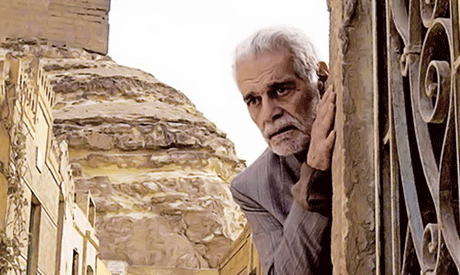
Omar Sharif in Al-Mosafer (Photo: Al-Ahram)
Al-Mosafer (The Traveller) is a debut feature length film by Ahmed Maher, starring Omar Sharif, Khaled El-Nabawy and Cyrine Abdel-Nour. Produced and directed in 2009, it has taken the film nearly a year and a half to open in Egypt due to numerous delays, such as a distribution contract that mandated the film first be screened internationally.
Khaled El-Nabawy and Omar Sharif play Hassan, a postal worker who recounts three memorable days of his life. He is a rather ordinary and somewhat overbearing man. Three eras and three cities are captured beautifully in great part due to the cinematography of Marco Onorato. Port Said in 1948, with its large foreign presence, is presented magically, with laudable choices of music, costumes and casting along with a phantasmagorical set design. The scenes are picturesque and surreal.
The next day recounted is in Alexandria in 1973. The city’s yellow and black taxis are roaming the streets and the quality of lighting is wonderful. Theserenity of Alexandria in the 1970s is palpable.
The last day is in set in Cairo in 2001. It is a city full of contradictions, boisterous, unwelcoming and poor, with a façade of religiosity. Towards the end, the city is depicted at night and the scenes became dreamy and fantastical.
The theme of the film is love. Love is what matters and is what is worth remembering even for a man who has so foolishly squandered his chances at it. That one concept, while commendable, is repeated incessantly throughout the film where love takes on different shapes - the love of a partner, the love of a child and the love of a grandson - but the ideas around it remain the same.
Hassan’s reactions to love vary across time and by the time he embraces love, it may be too late. It seems that even for this disdainful man, the memories he holds dear are those when he was closest to love despite his somewhat perverted expressions of it.
Despite the repetition, the idea is barely decipherable due to the inadequate script. The emphasis on the idea detracts from the characters who are flat and have no features to identify with. Characters are mostly formless and there is a large discrepancy between the performances of Khaled El-Nabawy and Omar Sharif, such that it is barely recognisable that the young Hassan (Khaled El-Nabawy) is the same person as the old Hassan (Omar Sharif). Sharif is oozing with character and charisma when not much is needed and El-Nabawy showed none at all when some is necessary. Despite Cyrine Abdel-Nour’s delightful appearance, her lines are delivered awkwardly and undermine whatever value the shots possess.
The picture design, sound design and sound mixing are remarkable. The set designs are meticulous and much attention is given to the details of each era, whether it is sound, costumes or music. Almost everything about the film is commendable except the film itself.
The real trouble with the film is that nothing brings all its beautiful elements together. Somewhere between the screenwriting and direction, the film fails to hold together. A feature length film may have been an over ambitious attempt by Ahmed Maher to capture just one idea. One can look at a beautiful picture for only so long, and in the end, a full-length feature film proved too lengthy for the material presented. Despite the film not showing any signs of poor filmmaking, it may provide viewers with a poor experience. One cannot help but think that all the great actors, cinematography, and sound mixing were wasted, perhaps as wasted as Hassan’s love.
Cast: Omar Sharif, Khaled El-Nabawy, Cyrine Abdel-Nour, Sherif Ramzy, Alaa Morsy, Basma, Amr Waked, Youssef Dawoud.
Music by: Fathi Salama.
Written and Directed by: Ahmed Maher.
Showing at Renaissance Nile City Cinema, Stars Cinema, Bandar Cinema.
Short link: